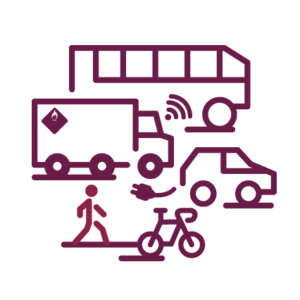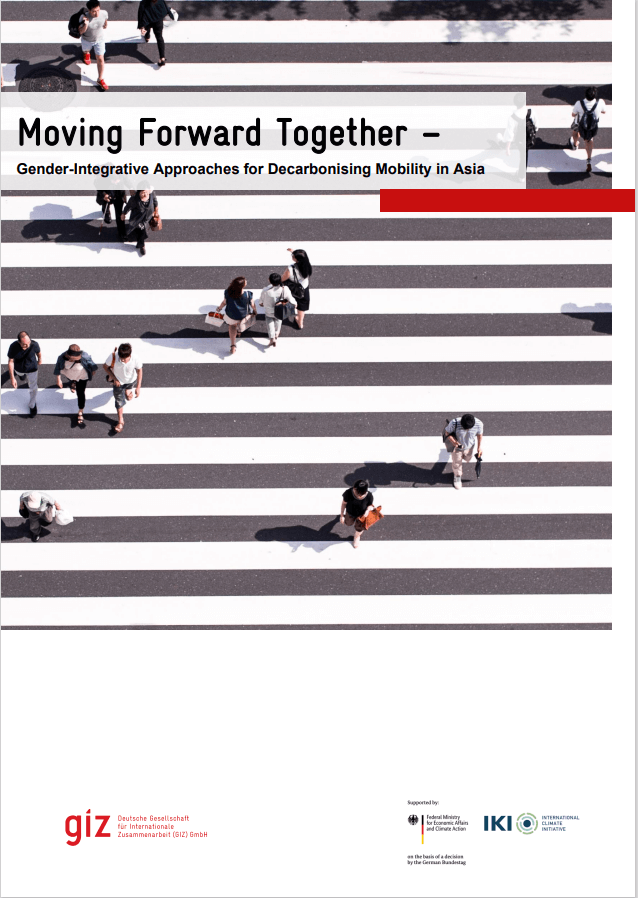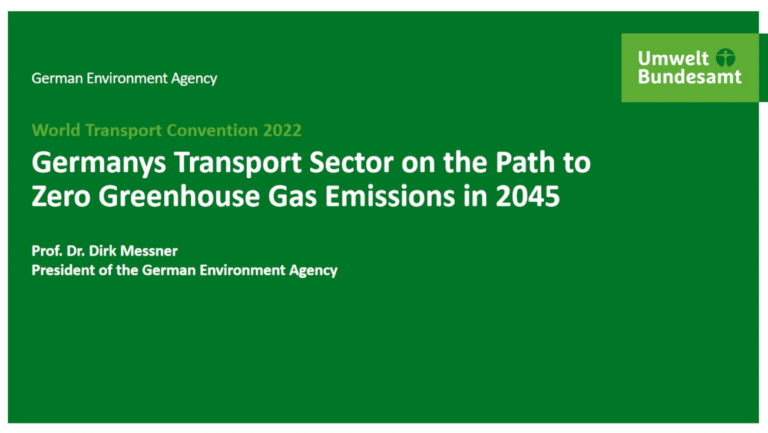The 5th Transport and Climate Change Week (TCCW) took place between 9th and 13th May, 2022. It is an international conference focused on knowledge-sharing and peer-to-peer exchange on the challenges and best practices for achieving sustainability goals and decarbonisation in the transport sector. Around 1,500 experts and decision-makers from around the world joined the week-long conference through its online platform, where they could follow and engage with the events, as well as connect in online networking spaces.
This year’s TCCW took place across four regional hubs (Africa, Asia, Latin America, and South-East Europe) and at a hybrid conference in Berlin, with each region holding a dedicated conference day and livestreaming events throughout the week, including panel discussions, specialised workshops, or country spotlight sessions.
Under its focus on sustainability in the transport sector, and the encouraging hashtag #wechangetransport, the topics of the TCCW ranged from transport policies, governance, or active and electric mobility to urban mobility planning and green freight. With China being an indispensable player in the global sustainable transition to meet the Agenda 2030 and the Paris Agreement – China’s commitments to which are reflected in its dual carbon goals of peaking carbon emissions by 2030 and reaching climate neutrality by 2060 – best practices and ongoing efforts in China were also represented at the TCCW.
In a series of topical discussions throughout the week, contributions were also provided by Chinese partners of the mobility team at GIZ China, including the Transport Planning & Research Institute (TPRI) of the Ministry of Transport (MoT), the China Society of Automotive Engineers (China-SAE), Tongji University, the International Council of Clean Transportation (ICCT), and the China Sustainable Transportation Center (CSTC), as well as by GIZ colleagues. Below is a brief summary of some of the sessions featuring a discussion of China’s experience in individual areas of sustainable transport with links to the session recordings where available.
Visit the TCCW website for the full programme with links to individual session recordings, and follow the conference YouTube channel for further uploads.
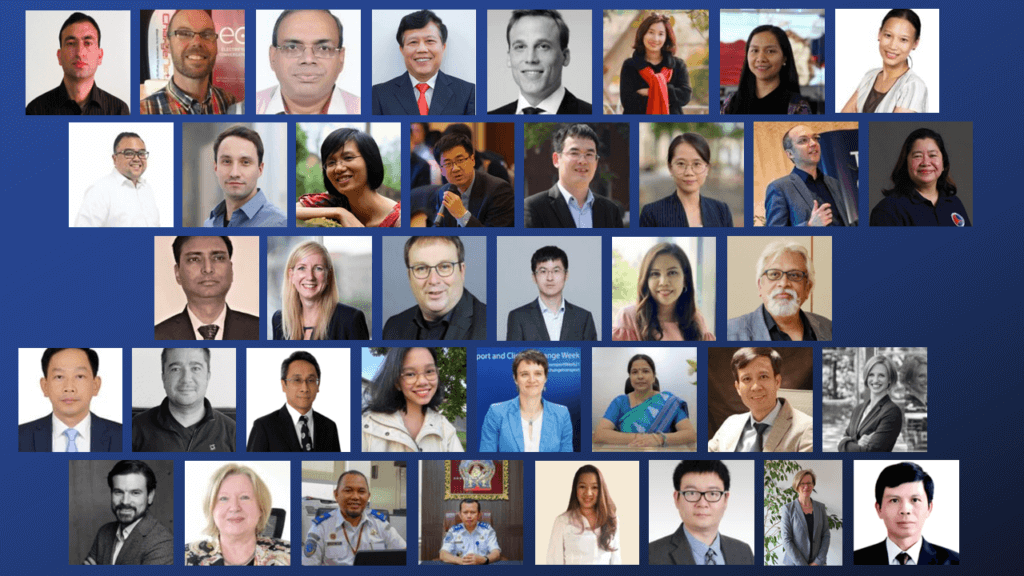
Asian Active Mobility Session: Tools and approaches supporting policy dialogue and getting political commitment on active mobility actions/implementation
Side Event with Walk21, Pasig Transport and Decisio SRL (recording available here)
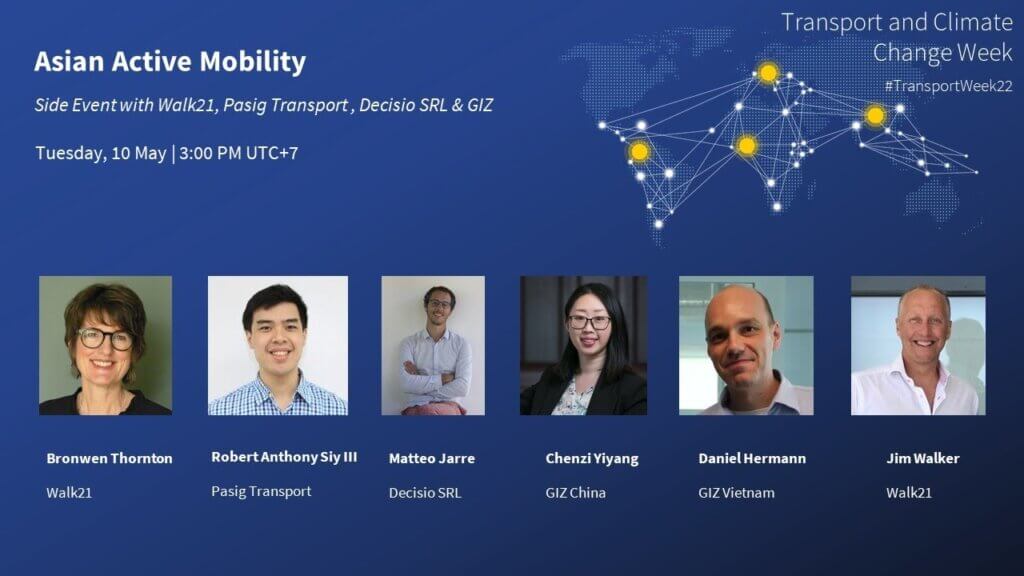
This session explores the tools and approaches to establishing and supporting a policy dialogue with local/city governments and to putting active mobility on the political agenda. Best practices from Asia and Europe are presented, highlighting the need for strategic policy frameworks and innovative participatory approaches for the effective promotion of active mobility. As an ongoing research and pilot project in China with these aims in mind, Ms Chenzi Yiyang presented on the development of an Active Mobility Friendliness Indicator System, which is also geared towards establishing a foundation for a National Active Mobility Strategy for China.
Speakers:
Daniel Hermann, GIZ Vietnam
Matteo Jarre, Decisio SRL
Robert Anthony Siy III, Pasig Transport
Bronwen Thornton, Walk21
Jim Walker, Walk21
Chenzi Yiyang, GIZ China
Digitalisation for Transport: New ways and possibilities
Workshop with partners from China, Vietnam, and Indonesia (recording available here)
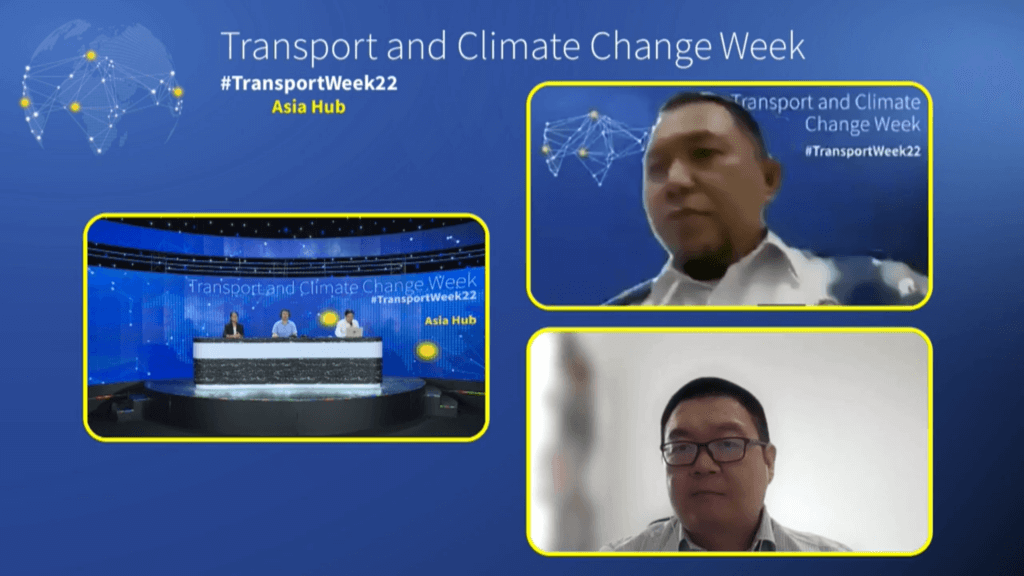
In this session, four presentations are given on digitalisation in the transport sector at the policy and application level in Vietnam, China, and Indonesia. Providing an overview of the regulatory and technological background to data collection and optimisation in China, Dr Li Jian from Tongji University also explores the applications for optimal use of data in China, particularly with regard to its integration in broader Smart City concepts.
Speakers:
Hadi Setyabudi P, Ministry of Transportation Indonesia
Vu Thu Giang, GIZ Vietnam
Dr. Li Jian, Tongji University, China
Tung Le Thanh, Technology and Information Center – MOT Vietnam
eMobility – EV Charging Infrastructure: Policy, Technology and Projects
Panel discussion (recording available here)

Speakers from several Asian countries showcased current activities and trends from the electric mobility charging sector. During a panel discussion, a deeper exploration of the commonalities and differences between these approaches was undertaken. Mr Hu Jinyong of China-SAE provided insights to the innovative practice of battery swapping in China.
Speakers:
Yoga Adiwinarto, Transjakarta
Stephen Draexler, GIZ Germany
Hu Jinyong, Center for Vehicle Electrification of China Society of Automotive Engineers (China-SAE)
Dr Pimpa Limthongkul, National Energy Technology Center (ENTEC), National Science and Technology and Development Agency, Thailand
Zakir Rather, IIT Bombay, India
Dr Le Anh Tuan, Hanoi University of Science and Technology
Country Spotlight
China, Vietnam, and Thailand (recording available here)
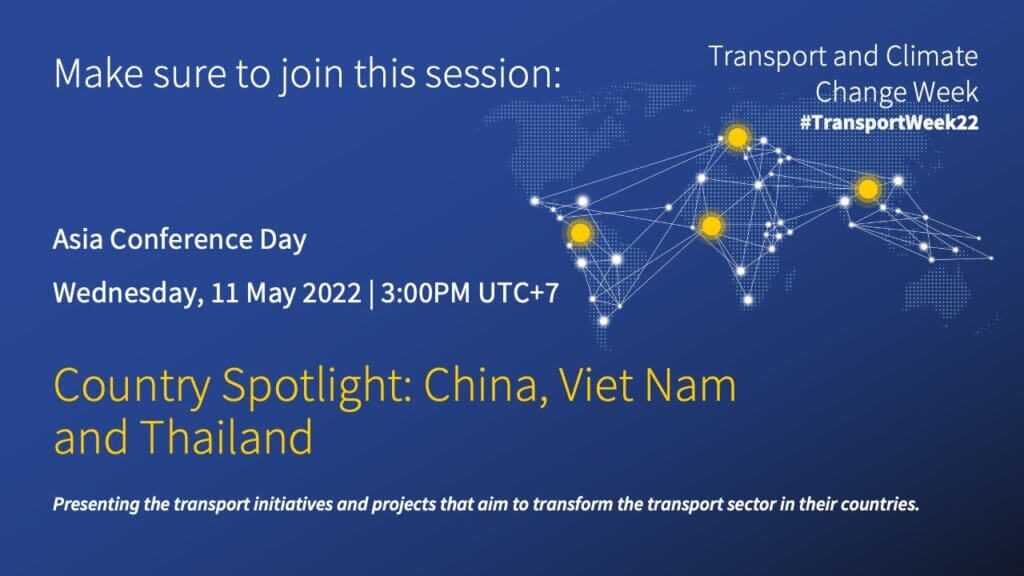
Country partners from Vietnam, Thailand and China presented on the transport initiatives and projects aiming to transform the transport sector in their respective countries. An overview of climate-related challenges and practices in China was provided by Mr Xu Honglei of the Transport Planning and Research Institute (TPRI) of the MoT. According to Mr Xu, emissions from road vehicles form the absolute majority of emissions from the transport sector, accounting for approximately 87%. The main driver for more profound emissions reduction in China’s transport should be optimising the structure of transport modes and their energy composition. The core path is twofold: decarbonise energy use in transport and achieve intelligent and efficient passenger and freight transport. A subsequent discussion of specific sub-topics was joined by Mr Sebastian Ibold of GIZ China and representatives of Thailand and Vietnam.
Speakers:
Chutinthorn Mankhong, Office of Transport Policy and Planning (OTP)
Surapong Meantmitr, Office of Transport Policy and Planning (OTP)
Duong Tran Anh, Department of Environment – MOT Vietnam
Honglei Xu, Transport Planning & Research Institute (TPRI) of the Ministry of Transport
Sebastian Ibold, GIZ China
Coffee & Wine Chat on SUMPs
Exchange between Asia and Latin America (the recording of this session will be available soon. The session recordings can be accessed here)
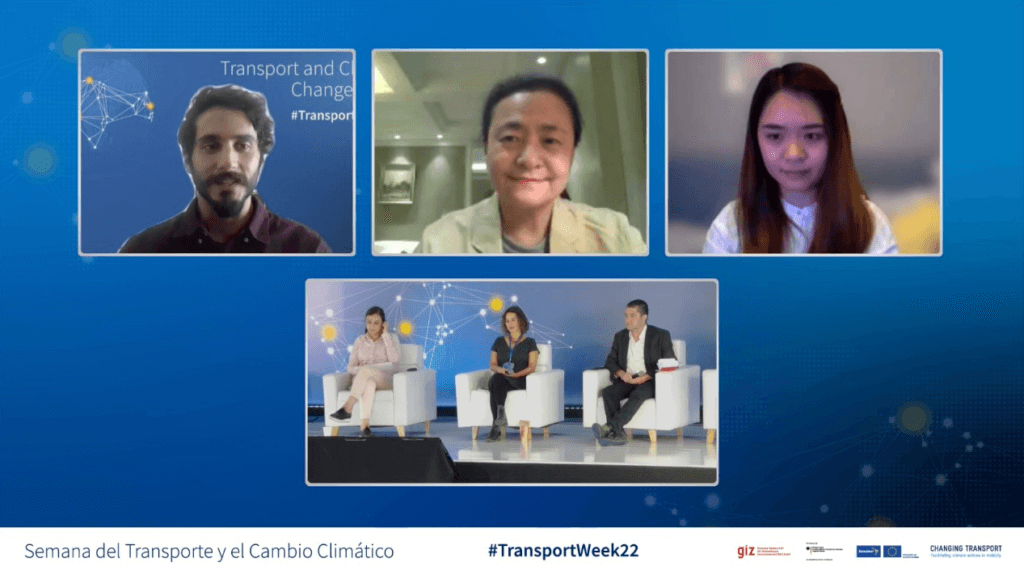
Sustainable Urban Mobility Plans (SUMPs) are strategic plans designed to satisfy the mobility needs of people and businesses in cities and their surroundings in a sustainable and inclusive manner. But how to start the process, what are the challenges and the key sector factors? To showcase the commonalities and differences in approaching SUMP, representatives of SUMP development in Foshan (China), Trujillo (Peru), and Antofagasta (Chile) exchanged on their experience after short presentations about each city. Dr Wang Jiangyan (Director) and Ms Yin Jieying from the China Sustainable Transportation Center (CSTC) provided insights into the challenges of the first SUMP development in China and the ways to tackle them, including highlighting existing principles and policies at national and local level that stimulate the application of an inclusive and sustainability-focused planning methodology. (More information about the SUMP concept and the SUMP Foshan project can be found here in our blog article.)
Speakers:
Mateo Gómez (moderator), MobiliseYourCity (MYC)
Andrea Palma, GIZ
Mariela Tantaleán Olano, Transportes Metropolitanos de Trujillo – TMT
Rodolfo Ugarte Silva, Gobierno Regional de Antofagasta
Dr Jiangyan Wang, China Sustainable Transportation Center (CSTC)
Jieying Yin, China Sustainable Transportation Center (CSTC)
All Signals on Green? Setting Policy Direction for the Freight Transport Sector
Fishbowl discussion (recording available here)
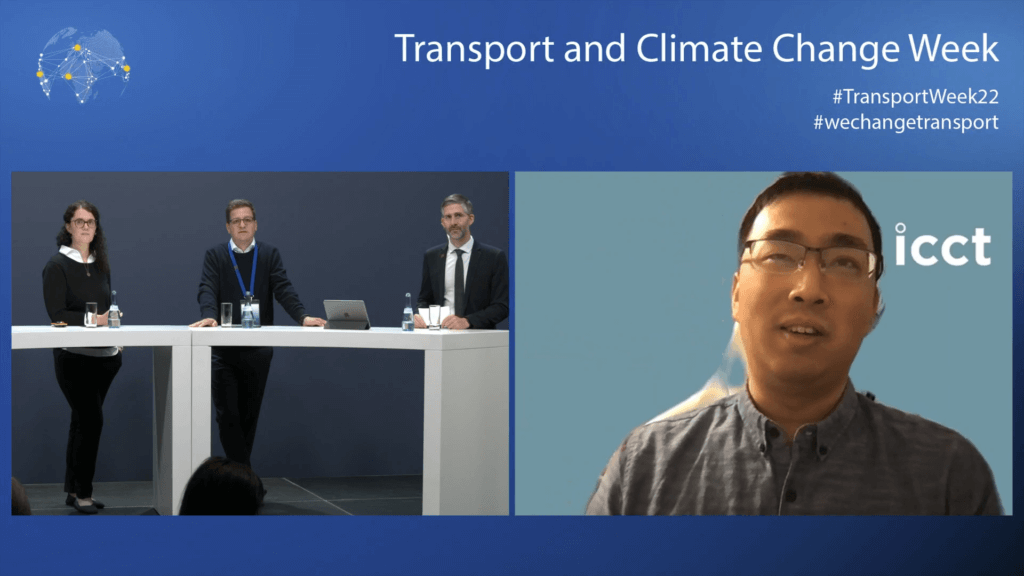
This high-level fishbowl discussion provides expert insights and diverse perspectives from India, China, and Europe, and an interactive Q&A on questions such as: What does it take to decouple growing freight transport from its carbon footprint? How do governments push zero emission trucks and succeed in multimodal freight transport systems? Mr Tianlin Niu of ICCT shared perspectives and experience from China in improving the fuel economy particularly relating to new energy applications in heavy duty vehicles.
Speakers:
Friedel Sehlleier (moderator), GIZ
Suzanne Greene, Dow
Shri Amrit Lal Meena, Department for Promotion of Industry and Internal Trade
Tainlin Niu, International Council of Clean Transportation
Prof. Dr. Moritz Petersen, Academic Director of Center for Sustainable Logistics and Supply Chains (CSLS)
The event is organised by GIZ on behalf of the Federal Ministry for the Environment, Nature Conservation, Nuclear Safety and Consumer Protection (BMUV) and the Federal Ministry for Economic Affairs and Climate Action (BMWK). It is financed by the International Climate Initiative (IKI).


